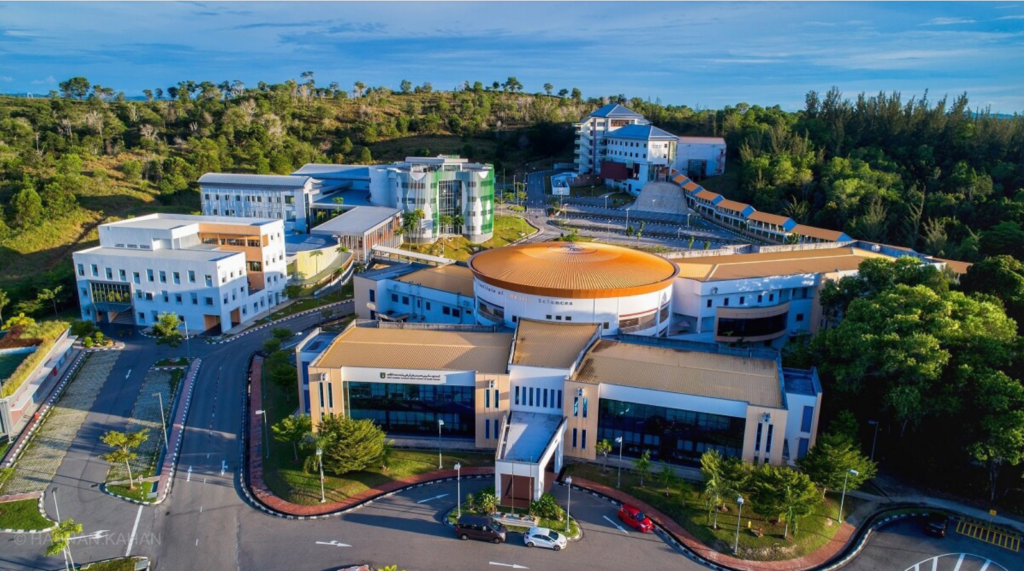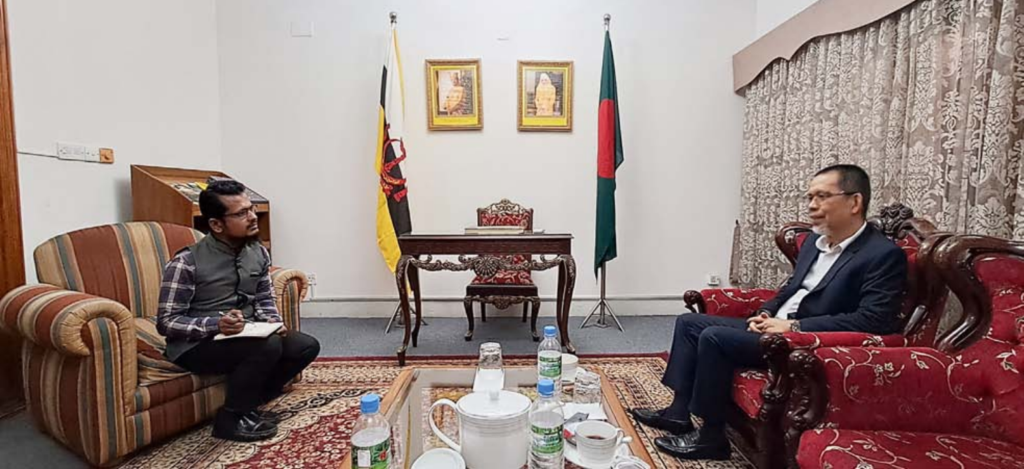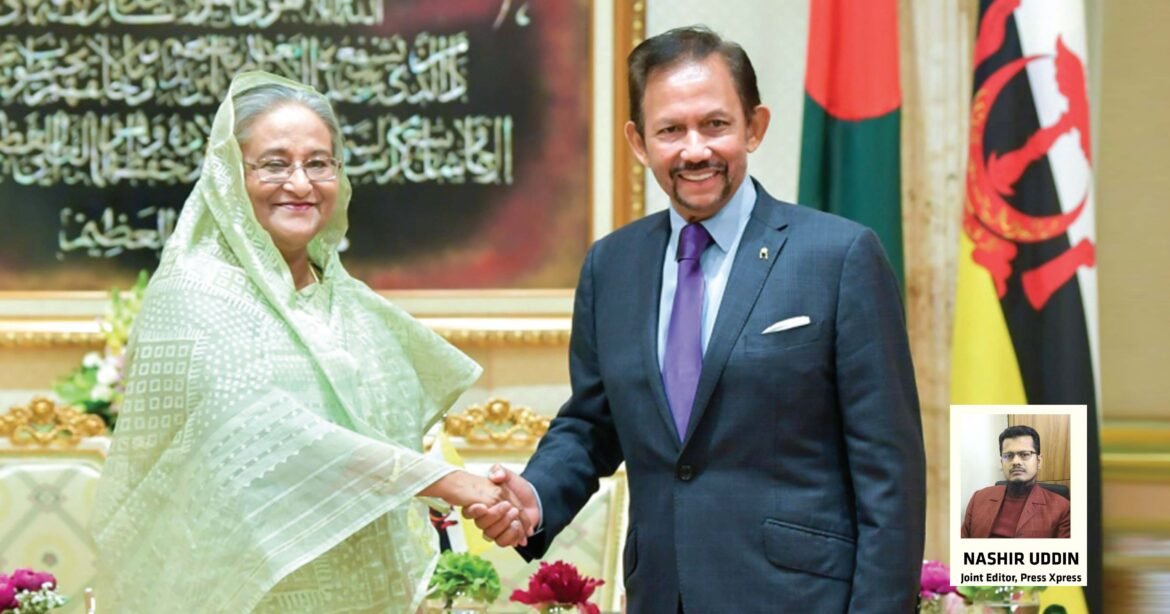Brunei welcomes Bangladeshi workers, be they skilled, semiskilled, or unskilled, based on the employers’ needs from time to time or as and when they are genuinely required.
“It is entirely about need assessment,” clarified the diplomat, brushing aside the idea of immediately setting any human resources import target.
High Commissioner of Brunei Darussalam to Bangladesh Haji Haris Bin Othman, disclosed this during an exclusive interview with the country’s most expensive and content-rich news magazine Press Xpress. Joint Editor of PRESS XPRESS Nashir Uddin recently conducted the interview session at Brunei High Commission’s Baridhara office in Dhaka.
Revealing the figures, the envoy said the exact numbers are yet to be confirmed, but there may be around 15,000 Bangladeshi workers in Brunei. The envoy added that his country welcomes foreign workers, including Bangladeshis, as and when required, which is subject to the country’s rules and regulations.
YOU CAN ALSO READ: POWERPLAY IN THE MIDDLE-EAST: LOOKING BEYOND THE LENS OF WESTERN WORLD
The Brunei envoy said Brunei and Bangladesh signed a Memorandum of Understanding (MoU) on the employment and recruitment of Bangladeshi workers during His Majesty’s the King of Brunei Darussalam’s visit to Bangladesh on 15-17 October 2022. This is another achievement for both countries. It aims at establishing an effective mechanism to oversee the employment/recruitment of workers from Bangladesh and ensuring the rights and obligations of both Workers and Employers are enforced per the laws and regulations of Brunei Darussalam.
Regarding tourism prospects, the envoy noted that the tourism potentials remain untapped. According to him, many Bangladeshi tourists travel to Malaysia, Singapore, Thailand and Indonesia – Brunei’s neighbours in the region – not only for leisure and adventure but also for medical treatment. Here is where he sees the silver lining. “We would like to draw a portion of these tourists to Brunei, which occupies a spot on the northern coast of the island of Borneo in Southeast Asia.” He also said, “Brunei looks forward to having greater relations in sectors like health, energy, defence and education, among others, with Bangladesh.”

Recalling that Bangladesh rolled out the red carpet to welcome Brunei Darussalam Sultan Haji Hassanal Bolkiah Mu’izzaddinWaddaulah marking the latter’s October 15-17 Dhaka visit, he said that the two nations at that time signed four instruments, including an air service agreement. The three other bilateral instruments are: ‘The MoU on the Employment and Recruitment of Bangladeshi Workers,’ ‘The MoU on the Field of Cooperation in the Supply of Liquefied Natural Gas (LNG) and other Petroleum Products;’ and ‘The MoU on the Recognition of Certificate Issued under the provisions of the International Convention on Standards of Training, Certification and Watchkeeping for Seafarers, 1978 as amended.’
Looking back at the Brunei Sultan’s last visit, the High Commissioner said their primary focus is to strengthen bilateral ties with Bangladesh and keep looking out for other areas of cooperation. The primary focus of Brunei regarding relations with Bangladesh is increasing trade and boosting the tourism and energy sector. They are also trying to enrich ties by bolstering cooperation in the education, ICT and health sectors. The Brunei envoy also recalled Bangladesh Prime Minister Sheikh Hasina’s historic April 2019 visit to Brunei, which marked a new milestone as the countries signed six MoUs for various types of cooperation, including in sectors like gas supply, fisheries, agriculture, livestock, youth and sports, and art and culture.
Brunei is an independent Islamic sultanate on the northern coast of Borneo Island in Southeast Asia and is surrounded by Malaysia. The country gained its independence as a British protectorate on 1 January 1984 but has been led by HassanalBolkiah since 5 October 1967 following the abdication of his father, Omar Ali Saifuddien III. The Brunei Sultan is one of the world’s longest-reigning and few remaining absolute monarchs. The country has one of the world’s highest standards of living due to its abundant oil and gas reserves.
As the High Commissioner’s interview progressed, various issues on the interests of mutual relations – ranging from Rohingya repatriation and air connectivity to regional cooperation and foreign trade – came up for discussion aimed at bolstering the long-lasting Brunei-Bangladesh bonding.
ROHINGYA REPATRIATION
Brunei is, the envoy said, optimistic about the ASEAN five-point consensus to help solve the Rohingya issue. “As a member of ASEAN (Association of Southeast Asian Nations), we stay centralised in our approach to not interfere in Myanmar’s internal affairs,” he indeed said, adding that “we don’t interfere in the internal affairs of other countries.” He, however, said let’s keep hope in continuing endeavours to repatriate the Rohingyas to their country of origin.
Asked whether Brunei can do more for Bangladesh concerning the pesky issue of Rohingya repatriation, the High Commissioner quipped, “We wish we could but indeed, with many limitations.” Since Brunei is a Member of ASEAN, Brunei will first, without doubt, observe and consider the ASEAN five-point consensus before it can decide unilaterally. The Five-Point Consensus will be Brunei’s priority in resolving issues related to Rohingya. On the other hand, Bangladesh will not be dependent on Brunei. There are several contexts, he elaborated, asserting that “We cannot be judgmental.”
There are other more critical stakeholders that Bangladesh will undoubtedly work with, for example, the UN, other countries and international bodies, especially the UNHCR, to effectively and efficiently resolve the repatriation issue. Like many experts, this decorated ambassador also agreed that the United Nations should also be more effective in dealing with the Rohingya issue. Of course, Brunei will continue to support Bangladesh in seeking a durable solution, to ensure the overall peace and security of the region.
He was, however, concerned about Rohingya children’s education. “There are issues like drug trafficking, criminal activities etc., and a need is there for Rohingyas’ education. If you have enough knowledge, you can guide yourself towards the path of prosperity,” he viewed. He also agreed that neighbouring nations and regional partners should extend further roles and cooperation. “It can have a far-reaching effect.” Asked how Bangladesh can step up its Rohingya repatriation efforts, the envoy had a somewhat diplomatic answer, saying, “The Foreign Ministry here has been doing its part vehemently”.
ENERGY COOPERATION
Brunei is steadily increasing its bulk of energy supply to Bangladesh – with the last few years witnessing Bangladesh’s import of LPG and diesel worth about 30-40 million Bruneian dollars annually from Brunei. In areas of energy cooperation, although the two nations further signed an MoU on the field of cooperation in the supply of liquefied natural gas (LNG) and other petroleum products during the Brunei Sultan’s first-ever Dhaka visit last October 2022, the Brunei High Commissioner said, there is no decision as of now regarding the finalisation of Brunei’s gas supply yet to energy-starved Bangladesh. “Things are in the process of negotiation right now,” he categorically said.
TRADE & INVESTMENT
The bilateral trade between the two countries is currently in Brunei’s favour, i.e., it exports more than it imports from Bangladesh. In the case of foreign trade, the energy-rich country predominantly exports diesel and LPG, while Bangladesh exports food items, beverages, leather products and vegetables, among others. Bangladesh perhaps can leverage on exporting more Bangladeshi products to Brunei as 70% of Brunei’s overall consumptions, as the High Commissioner said, are import-dependant He informed that Bangladesh might explore exporting rice and halal medicine to Brunei apart from halal beef and mutton. “The priority is to diversify our economy, and we can’t rely only on oil and gas. In sectors like fishery, livestock and agriculture, we could learn from Bangladesh and need Bangladesh’s cooperation,” he said, adding that ICT is another area of their importance. The Bangladeshi companies are welcome to trade with Brunei, he noted. Both countries see trade and investment as areas of crucial bilateral cooperation and expressed their keenness in working to increase the volume of two-way trade, which is potential. The ambassador also acknowledged that Bangladesh offered Brunei the advantage of investment in the special economic zones (SEZs) here. His country Brunei too, invited Bangladesh to consider investing in areas like food, ICT and manufacturing industries. The Brunei ambassador also stressed the need to increase trade for the greater good of both nations. He believes that Bangladesh has immense potential to become a valuable trade partner of Brunei. He also sees an upward turn in the volume of trade between the two brotherly countries in recent years. He said that in 2022, bilateral trade between these two brotherly nations reached an all-time high.

AIR & WATER CONNECTIVITY
Bangladesh and Brunei are also exploring air and water connectivity to boost the existing bilateral trade, investment and people-to-people contact. According to the ambassador, a good relationship is a win-win relationship, and that’s the basis. “Following the agreement signed on air services during the Sultan’s October visit here, people in Bangladesh especially are looking forward to having a direct flight from Dhaka to Brunei”, he noted.
On water connectivity, “Maybe we will also have to work out direct shipping arrangements in future, depending on volumes of trade,” he divulged.
COOPERATION IN HEALTH
According to High Commissioner Haris Bin Othman, improving ties in the health sector is one of our targets. Brunei previously takes nurses from other countries like the Philippines, he informed. However, Brunei may consider hiring a growing pool of nurses and other skilled workers from Bangladesh in the near future.
Bangladesh is achieving tremendous success in pharmaceutical exports, and Brunei High Commissioner is aware of this. Appreciating the pharmaceutical exports of Bangladesh, he disclosed that some Bangladeshi pharmaceutical companies are interested in expanding their businesses to their country. He said Brunei is interested in producing halal medicines in their country, and Bangladesh can share its expertise in this endeavour.
The envoy further said pharmaceutical companies from Bangladesh could submit their proposals to the Brunei Economic Development Board (BEDB), which may be offered a waiver in income tax, only 18% corporate tax, and other incentives upon approval like electricity, road and other infrastructural facilities.
MANPOWER EXPORT
The Brunei High Commissioner also emphasised manpower recruitment to bolster the ties between these two countries. Both countries have inked a deal in this regard during the Brunei Sultan’s recent official visit, he noted, saying that Brunei needs a workforce from overseas, including Bangladesh. They will take both skilled and unskilled human resources depending on needs assessment. He elaborated that the government will generally tender its projects to private companies. These companies will assess how many foreign workers they need to complete a task. A project’s volume, budget and size will be part of the elements to be considered for assessment. Concerned authorities will also do reviews before approving. He also cited that in previous years, Brunei’s oil and gas sector has shown more interest in hiring Bangladeshi workers.

EDUCATIONAL COLLABORATION
The Brunei envoy also emphasised the scope of increasing bilateral relations in education. He said more Bangladeshi students were studying in Brunei universities, more scholarships were available for Bangladeshi students, and more collaborations between universities of both countries were possible. Besides, the High Commissioner also said that Brunei and Bangladesh must explore further to enhance cooperation in the education sector.
Exclusive Interview with High Commissioner of Brunei Darussalam
Haji Haris Bin Othman has served as the High Commissioner of Brunei to Bangladesh since May 2019. Since then, except during the Covid-19 pandemic, he has been actively exploring Bangladesh and finding ways to play his part, taking the long-lasting Brunei-Bangladesh bilateral relation to a new high. This decorated flag-bearer of Bruneian diplomacy had a lively interview session with Nashir Uddin, Joint Editor of PRESS XPRESS, at his Baridhara office in Dhaka, during which he talked about different issues of bilateral interest and international cooperation aimed at bolstering the ever-growing ties.

Q1. How do you regard the Brunei-Bangladesh bilateral relations at the moment?
The bilateral relations between Brunei and Bangladesh have been warm and cordial since both countries established diplomatic connections in 1984. Bangladesh can leverage exporting more Bangladeshi products to Brunei as 70% of Brunei’s overall consumptions, as the High Commissioner said, are import-dependant. These brotherly relations have bolstered further, especially with the exchange of visits by leaders of two countries – the Honourable Prime Minister of the People’s Republic of Bangladesh’s visit to Brunei in April 2019 and the reciprocal visit by His Majesty, the Sultan of Brunei Darussalam, in October 2022. We have been making progress in some areas of cooperation; for example, we have signed several MoUs related to the supply of Liquefied Natural Gas, Agriculture, Fisheries, Livestock, Youth and Sports, Cultural and Arts, Employment of Bangladeshi Workers, Recognition of Certificates of Seafarers, and signed an Air Services Agreement. We established a Foreign Office Consultation years ago where we would discuss our bilateral relations and current relationship’s standing, find our way forward to enhance and advance them and explore other potential areas of cooperation, like education, health, tourism, ICT, air and maritime connectivity, and others.
Q2. Which areas can Bangladesh better its ties with Brunei?
I have no jurisdiction to tell what areas Bangladesh should explore to better its relationship with Brunei, and I believe the Bangladeshi side knows well what to do and what not. However, for Brunei, we should focus on activating all the MoUs that both countries have signed, taking action on the relevant provisions underscored in these MoUs, and continuously exploring other potential areas of cooperation.
Q3. Can Bangladesh and Brunei work in further cohesion for Rohingya repatriation?
Yes, we can, but certainly with many limitations. Since Brunei is a Member of ASEAN, Brunei will first, without doubt, observe and consider the ASEAN five-point consensus before it can decide unilaterally. The Five-Point Consensus will be Brunei’s priority in resolving issues related to Rohingya. On the other hand, Bangladesh will not be dependent on Brunei. There are other more critical stakeholders that Bangladesh will undoubtedly work with, for example, the UN, other countries and international bodies, especially the UNHCR, to effectively and efficiently resolve the repatriation issue. Of course, Brunei will continue to support Bangladesh in seeking a durable solution, to ensure the overall peace and security of the region.
Q4. What’s your take on the needs and ideas for making OIC more effective?
To answer this question, I need to know the issues the OIC has been facing, if any. If not, it would be unfair if I prejudged the OIC capability from only the outside. It’s better to pose this question directly to the Secretariat of the OIC or other independent researchers.
Q5. As we see, violence and offensive in occupied Palestinian territory have marked a sharp rise following a far-right government in Israel. What’s your view on this?
As the Government of Brunei and our people, we reiterate our condemnation in the strongest terms of the repeated blatant violations of the Palestinian’s human rights and dignity and the continuing deplorable actions by the Occupying Power that go against international law. We join the international community in calling on the Occupying Power to cease all forms of aggression, atrocities and unfair practices against the Palestinians. Brunei Darussalam will continue to support all efforts to find a comprehensive and lasting peace based on the two-state solution. We reiterate our solidarity with the Palestinian people, including their rights to self-determination and the existence of an independent and sovereign State of Palestine, based on the pre-1967 borders, with East Jerusalem as its capital.
Q6. Is there real potential that Brunei has been working on wooing a more significant number of tourists from Bangladesh? Is there a further need to ease Bruneian visas for Bangladeshis?
As I mentioned in my answer to question No two (2) above, we will continuously explore other areas of cooperation that benefit our people and these two countries. Therefore, we’ll welcome Bangladeshi tourists, as many as possible, to Brunei. At the same time, we will have to prepare ourselves to ensure Bangladeshi tourists are well served, entertained and satisfied with our tourists’ related services in Brunei. Regarding visa processes and procedures, we are comfortable with the current arrangements.
Q7. What more can be done to boost air and shipping connectivity to help grow bilateral trade and people-to-people contact?
Both countries strive to improve and increase our tourists to visit our two countries in the G to G, B to B and People to People contexts. We are hopeful that more tourists from Bangladesh will visit Brunei in the months and years to come, and vice-versa, without denying the importance of exploring the possibility of having linkages or direct flights between the two countries. Apart from that, we would also like to see our trade volumes increase from year to year.


